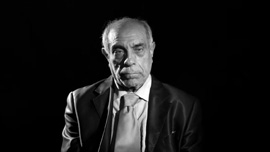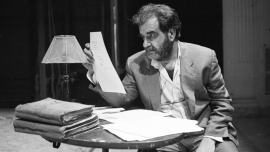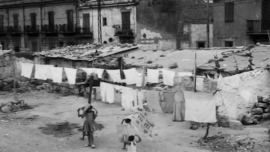"If I think about the future of cinema as art, I shiver" (Y. Ozu, 1959)
THE LAST THINGS BEFORE THE LAST (5) - La mafia non è più quella di una volta (Franco Maresco)
Sunday, 07 June 2020 12:41
Naked
Gli uomini di questa città io non li conosco – Vita e teatro di Franco Scaldati (Franco Maresco)
Tuesday, 27 October 2015 14:32Making someone exist
Boris Nelepo
As the founding father of the Cinico TV, since the early 1990s Franco Maresco has been braiding together a cinematic chronicle of his native Sicily and, above all, hometown of Palermo, performing for his homeland the same duty documentarian Peter von Bagh served to Finland, or Želimir Žilnik to the former Yugoslavia and Serbia. This kind of history couldn’t be written without appeals to certain exemplary individuals, so Maresco’s latest, Gli uomini di questa città io non li conosco – Vita e teatro di Franco Scaldati, bears a dedication to Franco Scaldati, the grim theater director and playwright, "the Beckett of Palermo" who once reformed the language spoken on stage as he smuggled in the Palermo dialect along with the local color.
Scaldati’s body of work represents an act of relentless resistance both to the political degradation of his country and to the intellectuals’ comfortable partisanship. In the late 1970s, at the peak of political turbulence, he abandoned the social radicalism of his early plays for the pure poetry of Lucio, a tale of a naive philosopher who converses with the moon, which alienated from him the communist sympathies. Tired of being broke for years, neglected by cultural institutions, and relegated to basement venues, Scaldati at last found employment at Palermo’s major theater, Biondo, much to the chagrin of the bourgeois snobs craving a nonconformist poster boy. Be that as it may, there he remained a hired hand, unable to produce his own plays until the late 1980s when he finally managed to launch Il Piccolo Teatro, a company as independent in spirit as it was short-lived. In his later years, Scaldati almost gave up on his vocation and limited his public appearances to recitals of his new works, mostly comprising phonetic games. Perhaps disillusioned with the idealistic view on art’s global mission, he nevertheless continued to engage in direct activism: for over a decade, Scaldati ran an acting lab for at-risk youth. Rather than dream of "making a difference" with his art, or worry over the artistic results, he simply relished the experience of interacting with people who couldn’t fathom a life outside their bad neighborhoods.
I Don't Know Anyone in This Town is an especially personal and intimate project for Franco Maresco, who considered Scaldati, deceased in 2013, a friend, a teacher, and a mentor (last year he even put on a standard-Italian production of Lucio). Scaldati himself dabbled in acting appearing in several movies by the Taviani brothers and Giuseppe Tornatore, but it was Maresco who captured in full his penchant for comedy in The Return of Cagliostro. The principal ambivalence of I Don't Know... lies in the fact that on the surface, it looks like an ordinary documentary, as good as made for TV. One of the most truly singular filmmakers working today, Maresco chose to forego any kind of authorial voice or personal style, so the Venice audiences, by and large, dismissed the festival’s greatest masterpiece as a strictly provincial narrative handled too conventionally. What does it matter, though? After all, Maresco’s Scaldati, whose existence had almost escaped us but didn’t, is a much more compelling character than most fiction has to offer. Making someone exist – isn’t it as ambitious a task as today’s filmmaking can tackle?
Of course, just like Maresco’s masterful Belluscone. Una storia siciliana released last year, I Do’'t Know... tells a story of defeat - an individual’s, a country’s, art’s, Franco Maresco’s own. Only once did Scaldati enter the Biondo Theater through the main doors as his casket was carried inside to the sound of politicians rhapsodizing about "losing the living embodiment of Palermo’s soul." Two years later, Maresco comes to the theater to ask its audience members if they’ve ever heard of Franco Scaldati. No, no one has. However, the film’s epigraph perfectly encapsulates what Scaldati had to say on the subject: “Beauty is of the defeated. The future is not of winners, it is of those who are able to live”.
Viaggio in Italia 1 - Conversazione con Franco Maresco
Monday, 26 October 2015 18:28Naked
Ultimi articoli pubblicati
- 2025-03-24 Chime/Cloud/Serpent’s Path (Kurosawa Kiyoshi)
- 2025-03-24 Abiding Nowhere (Tsai Ming-liang)
- 2025-03-24 The Box Man (Gakuryū Ishii)
- 2025-03-24 Grand Tour (Miguel Gomes)




